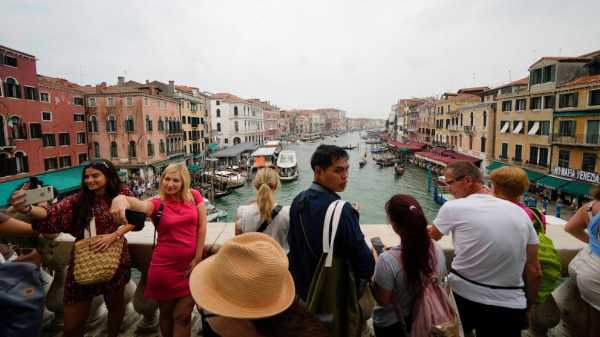
VENICE, Italy — Venice on Thursday again escaped the tarnish of UNESCO's list of world heritage sites in danger, drawing a victory cheer from the mayor but scorn from environmentalists and scientists alarmed by the impact of mass tourism and climate change on the storied lagoon city.
At a meeting in Saudi Arabia, member states disregarded expert findings that Venice's “outstanding universal value” was under “a growing and increasingly urgent threat.” Instead, they praised the city's conservation efforts, in particular a last-minute pilot project approved two days ago that will make Venice the first city to charge entry.
Venice similarly avoided joining the list of sites in danger two years ago after the Rome government announced a ban on big cruise ships past St. Mark’s Square and through the Giudecca canal.
Mayor Luigi Brugnaro welcomed the decision as proof that “Venice is not at risk,″ calling the experts' recommendations ”misleading.”
Civic groups, however, continue to emphasize the threat to Venice from mass tourism, which they say is transforming the city into a mere destination, depriving it of lifeblood as a thriving center that would attract both residents and new businesses.
The much-ballyhooed pilot project, charging 5 euros ($5.30) to day-trippers on 30 high-traffic days next year, only reinforces a low-brow image of Venice, they said.
“When you see how beautiful Venice is, what an incredible lifestyle the city can offer, when mass tourism isn’t killing it, you realize that Venice is to some extent wasted on short-term visitors,″ said Jane Da Mosto, executive director of the NGO We Are Here Venice. ”Venice is a place where more people should be able to live and create more lives and families and jobs and exciting work opportunities.″
Expressing disappointment in UNESCO's decision, Da Mosto said the language used by some of the delegates “made me think they might be using material provided by Italian diplomatic channels."
“I really hope UNESCO will do something courageous to restore our hope in the convention″ governing world heritage sites, she said.
The Union of Concerned Scientists said the decision “signals an alarming trend of nations not being held accountable for protecting some of the most iconic and irreplaceable natural and historic sites around the globe.” It noted that Venice is “increasingly vulnerable to severe flooding and water damage.”
The city's 6-billion-euro underwater barriers, cited by several member states as evidence of Venice’s commitment to preservation, have been employed since severe flooding in 2019 to protect the city from the most serious flooding. But the project has been riven by corruption, cost overruns and long delays, and is not yet fully complete — a lapse noted by the experts.
As the UNESCO World Heritage Committee meeting loomed, housing activists in Venice this weekend announced that the number of tourist beds had officially surpassed the number of residents: 49,693 to 49,304.
That imbalance drains the city of services and clogs the city’s tight alleyways and water buses with suitcase-laden tourists, pushing more Venetians to move to the mainland, a trend that dates back decades.
“Too much tourism is just a threat for our city,'' said Remi Wacogne, an activist with the OCIO civic observatory on housing. ”All sorts of measures should be taken, starting with regulating short-term rentals, which are responsible for most of the increase in tourist beds."
Venice officials, however, have failed to limit short-term rentals, despite being the only city in Italy allowed to do so under a special statute.
The UNESCO World Heritage Committee recommended Venice for the list of sites in danger, citing the negative impact of mass tourism, damage to the lagoon by large ships and oil tankers entering via the Malamocco canal, and climate change leading to more frequent high tides, as well as uncoordinated development.
After the decision, the committee reiterated its concerns, and underlined that “further progress still needs to be made for proper conservation” of Venice and its lagoon.
Italy has until December 2024 to present a detailed plan, which will be discussed at the World Heritage Committee meeting in 2025.
UNESCO officials have emphasized that a downgrade is not meant to be punitive, but to alert the world community that more needs to be done to address issues plaguing a World Heritage site.
Venice's top budget official, Michele Zuin, was defiant heading into the vote, telling The Associated Press that Venice wanted to avoid the endangered list. “But it is not as if we are slaves of UNESCO.”
Sourse: abcnews.go.com






